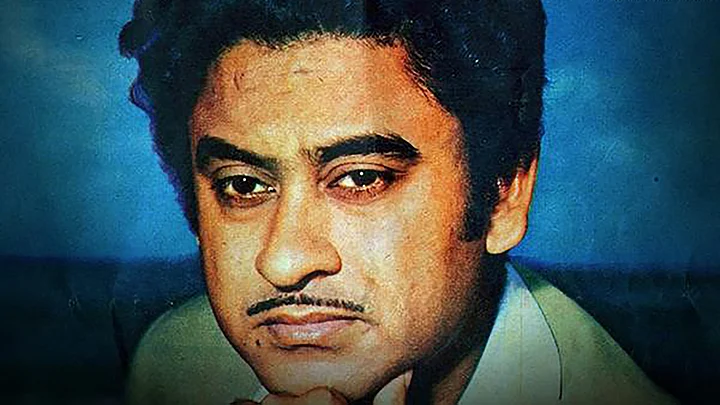No one goes in there. No one has sought to investigate whether the neglected house will ever be inhabited again. Or will the house inexorably be sold for redevelopment?
Mystery swirls around the Ganguly House, situated just a heartbeat away from the samadhi of Kishore Kumar in Khandwa, Madhya Pradesh. He was born there and spent the formative years of his life there before moving to Bombay to seek fame and fortune in film land.
The single-storey structure is fading out with age. It is guarded by an 80-something, puckish man who goes by the name of Laala. He had placed two marigold garlands on the creaking metal gate of the phantom house last Tuesday, October 13, the 28th death anniversary of Kishore Kumar.
As soon as I stopped opposite the phantom house, Laala came sprinting towards the taxi, grinning goofily, offering a plate of jalebis and said, “You know Kishore and I were buddies. He’s gone but I’m still here. He would often ask me to come over and stay with him in his big bungalow in Bombay… but no, no, my place is here.”
Childhood Days in Khandwa
The jalebis, he pointed out, were from his buddy’s favourite mithai shop in the neighbourhood, a hangout which, in fact, was alluded to in the zany comedy Half-Ticket. Apocryphal stories go that the pride of Khandwa would frequently adapt moments from his growing up years in his films.
The zingy song Paanch rupaiya baarah aana from Chalti ka Naam Gaadi referred to the amount he needed to pay for college or else quit studies. The amount was paid in the nick of time.
Laala refuses to accept a tip, pleading:
My friend would not like that. I am just happy that some of his fans do stop by when his death anniversary is remembered here every year.
Ask Laala, “Who owns this house?” and he goes blank. Other locals state that it belongs to the surviving family of Anoop Kumar. Of the three Ganguly brothers, Ashok Kumar was the eldest, Kishore Kumar the youngest.
Indeed, the senior-most brother was older than the youngest by 18 years. Kishore Kumar as a kid wouldn’t recognise Ashok Kumar when he’d return home from Mumbai, complaining about why the kitchen sizzled with painstakingly-cooked meals for the visitor. “Why is he being given special treatment?” Kishore Kumar, in his knee-pants, would complain.
A House Full of Lurking Memories
By then, Ashok Kumar had established himself as an actor with the Bombay Talkies classic Acchut Kanya, thanks to the studio’s boss Devika Rani who believed she had spotted an actor of immense potential.
Ashok Kumar’s brothers had followed him to the city of the arc lights. Anoop couldn’t ever match the stupendous success of his brothers.
“You mean, no one from the family has laid claim to this property?” I quiz the crowd which has gathered around the taxi, wondering why I’m nosing around.
“Not that we know,” they shrug. The Ganguly House is a monument, a reminder of the nurturing ground of Kishore Kumar. Yet today, it is dark, empty but for a few sticks of furniture and a few sepia-toned photographs of the legend in his toddler days.
Kishore Kumar’s wife, the now-retired actress Leena Chandavarkar, has kept off the premises. So has playback singer Amit Kumar, the legendary singer-actor-director’s son from his first marriage to the Bengali actress Ruma Guha Thakurta.
Keeping Kishore Kumar Alive
Curiously, neither Leena Chandavarkar nor Amit Kumar have attended the death anniversary event hosted by the Madhya Pradesh state government for the last seven years. The Kishore Kumar Samman Award is presented annually in the alternating categories of film acting, lyric writing, script writing and direction. Besides the presentation of the award, the occasion is marked with an entertainment spread.
This year was a first in two respects. For the first time, a woman director – Sai Paranjpye – was honoured with the Samman for her contribution to cinema as a director of formidable repute.
Another first: Sumeet Kumar, the 33-year-old son of Kishore Kumar and Leena Chandavarkar, actually showed up as the showstopper to render a medley of his father’s unforgettable songs ranging from the playful Ek ladki bheegi bhaagi si and Jhum jhum jhum Jhumroo to the melancholic Ghungroo ki tarah bajta hi raha hoon main.
The crowd’s response was intuitively emotional, with many in the enormous audience at the Police Grounds reaching for their handkerchiefs. The local press reported the event as the lead story in bold headlines. The national media, however, wasn’t clued into the return of the grandson of the soil.
Resting Place, a Victim of Apathy
A three-hour drive from the Indore airport, Khandwa is where Kishore Kumar wanted to rest in peace, so to speak. His samadhi, though, isn’t as widely-known as Elvis Presley’s home Graceland is in Memphis, Tennessee.
Fortuitously, official efforts are on to make the samadhi a must-visit for countless loyal Kishore Kumar fans. At the awards and entertainment evening, a minister made an impassioned case for making the spot far more accessible than it is now.
Meanwhile, the Ganguly House could fade out any day now. If the property was bequeathed to Anoop Kumar, who is no more, his four daughters and a son have not yet made any claims for its proprietorship, according to local sources.
Laala continues to look after the house without any intention of favour or gain. The question is: How long will the unacknowledged place of historical interest survive?
The answer to that my friends, as Bob Dylan put it, is blowin’ in the wind.
(The writer is a film critic, filmmaker, theatre director and a weekend painter.)
